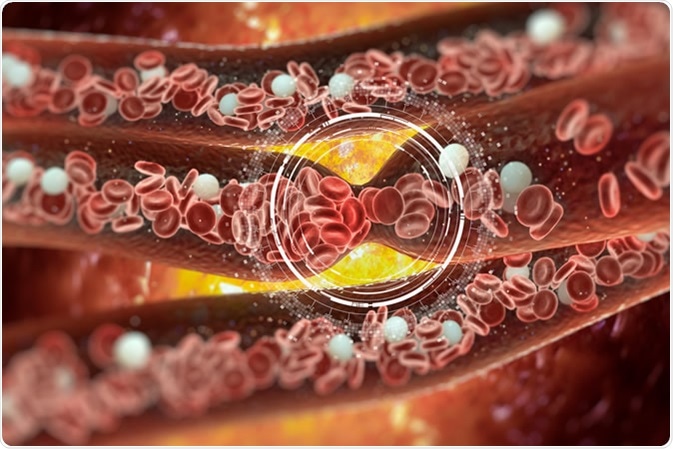Rare clotting factor deficiencies are a collection of bleeding disorders associated with issues with clotting factors. These conditions are inherited and target the proteins in the blood that control bleeding. Rare clotting factor deficiencies do not include deficiencies in clotting factor VIII and IX, which are known as hemophilia A and B.

Blood Clotting Illustration. Credit: Vitstudio / Shutterstock
The issue
Normally, clotting factor proteins collaborate in a cascade of chemical reactions known as the clotting process. This process stops bleeding by thickening the blood, forming a plug over the opening, and then encouraging tissue growth.
When clotting factors are deficient, the clotting process does not work properly, and this leads to bleeding. Rare clotting factor deficiencies include deficiencies in factors I, II, V, V and VIII, VII, X, XI, XIII, and vitamin K-dependent clotting factor deficiencies.
The extent of the bleeding associated with rare clotting factor deficiencies can range from mild to severe. Factor I, II, V, V and VIII, XI, and vitamin K-dependent clotting factors are usually mild, apart from when clotting factor I is present as afibrinogenemia. The severe rare clotting factor deficiencies include factor VII, X, and XIII.
Rare clotting factor deficiencies are inherited conditions. Most deficiencies are inherited in an autosomal recessive manner, although clotting factor I and XI deficiencies can be inherited in either a recessive or dominant fashion.
Some types, such as factor II, factor VII, and a combination of vitamin K-dependent clotting factor deficiencies can become apparent later in life secondary to other medical conditions, medications, or other causes.
Most rare clotting factor deficiencies are estimated to occur in one in a million people. This includes clotting factor I (dysfibrogenemia), V, V and VIII, and X. Less common are factor I (afibrogenemia), II, and XIII, which occur at a rate of 5 in 10 million, 1 in 2 million, and 1 in 3 million, respectively.
More common are factor VII and XI, at 1 in 500,000 and 1 in 100,000, respectively. Estimates are lacking for factor I (hypofibrinogenemia) and vitamin K-dependent clotting factors.
Treatment
The ideal treatment for rare clotting factor deficiencies is supplementing with concentrates of factors. However, concentrates are only available for factors I, VII, VIII, XI, and XIII. Patients receiving these factor concentrates, which are manufactured from human plasma, are susceptible to infection from the donor. This infection can be prevented by having samples undergo viral inactivation.
For all clotting factor deficiencies, fresh frozen plasma is a treatment option. Fresh frozen plasma contains blood with all clotting factors and other important blood proteins. Because it contains all clotting factors, it can be administered when concentrates of the specific factor are not available. Furthermore, fresh frozen plasma is the most common treatment for factor V deficiency.
Several complications of this treatment are possible, such as disease spread if it has not undergone viral inactivation, circulatory overload and heart stress, and allergic responses.
Prothrombin complex concentrate is another treatment option for several rare clotting factor deficiencies. It contains a combination of clotting factors, including factors II, VII, IX, and X. Prothrombin complex concentrate is ideal for factor II and X deficiencies and vitamin K-dependent clotting factor deficiencies.
Like fresh frozen plasma and individual factor concentrates, prothrombin complex concentrate is made using human plasma and as such undergoes treatment to eliminate viral diseases.
Some treatments with prothrombin complex concentrate have reportedly been associated dangerous blood clots or thrombosis.
Complications during menstruation and birth
Because of menstruation and childbirth, adult and adolescent females tends to show more symptoms than males affected by rare clotting factor deficiencies.
Prolonged menstruation can be one effect of the condition, which can in turn lead to anemia. Pregnant individuals with some deficiencies, such as factor XIII and I (afibrinogenemia), can have an elevated risk of miscarriage and placental abruption, which is when the placenta separated from the uterus and disrupts blood flow to the fetus prematurely.
The main risk of pregnancy with rare clotting factor deficiencies is hemorrhage after birth. This may occur with all clotting factor deficiencies, but the severity of bleeding can be managed with correct treatment.
The treatment will differ between individuals, and is also influenced by personal and family history, the severity of the factor deficiency, and whether the delivery is by vaginal birth or cesarean section.
Further Reading
Last Updated: Jun 23, 2023